Fat City Blu-ray Movie
HomeFat City Blu-ray Movie 
Limited Edition to 3000Twilight Time | 1972 | 97 min | Rated PG | Sep 08, 2015
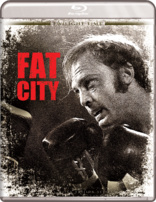
Movie rating
7.2 | / 10 |
Blu-ray rating
| Users | 0.0 | |
| Reviewer | 4.0 | |
| Overall | 4.0 |
Overview
Fat City (1972)
The story of two boxers and their problems. One of them is on the decline of his career while the other one just begins his ascent in this sport.
Starring: Stacy Keach, Jeff Bridges, Susan Tyrrell, Candy Clark, Nicholas ColasantoDirector: John Huston
| Drama | Uncertain |
| Sport | Uncertain |
Specifications
Video
Video codec: MPEG-4 AVC
Video resolution: 1080p
Aspect ratio: 1.85:1
Original aspect ratio: 1.85:1
Audio
English: DTS-HD Master Audio 5.1 (48kHz, 24-bit)
English: DTS-HD Master Audio 2.0
Music: DTS-HD Master Audio 5.1
Subtitles
English SDH
Discs
50GB Blu-ray Disc
Single disc (1 BD)
Playback
Region free
Review
Rating summary
| Movie | 4.0 | |
| Video | 4.5 | |
| Audio | 4.0 | |
| Extras | 1.5 | |
| Overall | 4.0 |
Fat City Blu-ray Movie Review
The Misfits.
Reviewed by Jeffrey Kauffman September 17, 2015John Huston’s name looms so large in the annals of 20th century filmmaking that its monolithic import can sometimes overshadow the fact that the iconic writer-director (and sometimes actor) actually had relatively long spells when he figuratively couldn’t get arrested, or literally offer a hit to cinema audiences. A cursory sampling of titles created under Huston’s aegis, films as legendary as The Maltese Falcon, The Treasure of the Sierra Madre, Key Largo, and The African Queen, would seem to suggest that Huston merely coasted from one huge success to the next, but even in his early directing career there were relative dips, as evidenced by the little remembered 1949 drama We Were Strangers. Huston’s output started to slow as the fifties gave way to the sixties, probably not so coincidentally at around the time Huston started appearing in more films as a performer. While the 1960s saw a number of interesting if flawed efforts from Huston like the fascinating if overwrought The Misfits and the goofy, gimmick laden The List of Adrian Messenger, by the end of the decade, most wags considered Huston a has been, an adventurer whose go for the gusto ethos had left him a burnt out shell of his former swaggering self. From our 21st century perspective, it’s easy to see that Huston still had a great deal of life and/or creativity left in him, as revealed in such 1980s outings as Prizzi's Honor, but in 1972, when Fat City arrived to almost universal acclaim and surprising box office returns, several “experts” seemed to be somewhat gobsmacked that Huston was still able to create something as visceral as this film detailing the squalid lives of small time boxers in and around Stockton, California.
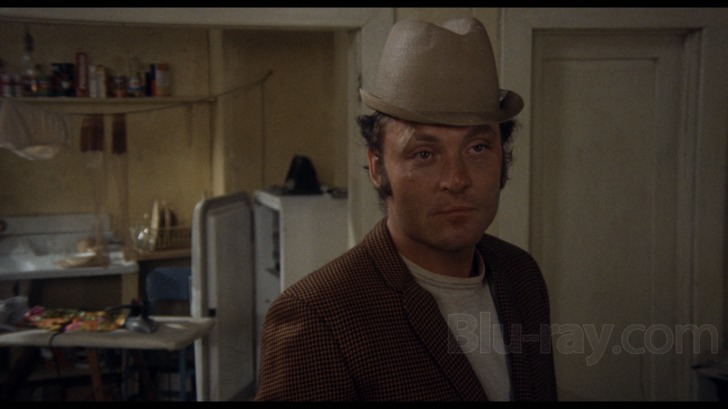
Films about boxing have tended to fall into a number of various categories. There are some outings like Clifford Odets’ venerable Golden Boy which posited the sport as a metaphor or at least an allegory for Odets to explore the oft-debated dialectic between “Art” and “Commerce”. Other films, like 1947’s Body and Soul and 1949’s Champion, pretty much ignored the “Art” aspect, focusing instead on the meteoric rise of their boxing heroes (and/or anti-heroes), while detailing all the trauma and occasional tragedy that accompanied such heady success. Later films like Rocky (and its follow-ups) more or less eschewed any nuance to simply offer tales of an underdog finally triumphing against considerable odds, all within a boxing milieu which frankly could have been any sport or even non-sporting discipline.
In a way, that same ability to divorce content from setting is part and parcel of Fat City, for while the gritty ambience of low life boxers is part of what gives the film its indelible impact, in a way Huston’s thesis (as articulated in Leonard Gardner’s screenplay, adapting his own 1969 novel) is simply one of destitute lives scrambling and scratching for some foothold on an ephemeral ladder of success, an aspect that Huston had investigated in several previous films (including the aforementioned The Treasure of the Sierra Madre and The Misfits). Here the two focal characters are an older has been (maybe a never was) fighter named Billy Tully (Stacy Keach) and a younger kid named Ernie Munger (Jeff Bridges) whom Tully thinks has "the right stuff".
There are a number of somewhat meandering subplots that are interwoven into the main arc following Munger’s attempt to ascend the ranks of the local boxing cards, while Tully muses over a potential comeback. Both guys ultimately get involved with different women, Tully with a sad woman named Oma (Susan Tyrrell, Academy Award nominated), and Munger with a young lass named Faye (Candy Clark) whom he may have gotten “into trouble”. While both of these tangents provide some powerful character beats for all four folks, they ultimately fall by the wayside as Huston keeps things centered on the squalid lives and putative careers of the two guys.
A lot of people have decried how supposedly “bleak” or “grim” Fat City is, and there’s no denying that the film has a depressive aspect which is hard to shake off. But there’s considerable humor here as well, albeit black at times, and the film has an almost palpable mood that perfectly captures lives in stasis despite lots of bobbing and weaving. Performances are uniformly excellent and Huston’s pacing is appropriately athletic.
Fat City Blu-ray Movie, Video Quality 
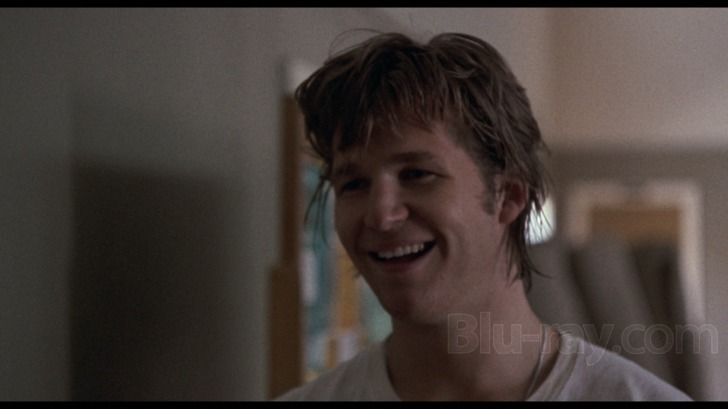
Fat City is presented on Blu-ray with an AVC encoded 1080p transfer in 1.85:1. This is another Twilight Time release culled from a new 4K scan, and the results are quite impressive, at least given an understanding that Huston and legendary cinematographer Conrad L. Hall opt for a tamped down palette that often exploits the dusty streets of Stockton and drab interiors of various boxing environments. When the film ventures out into more scenic territory, as in some scenes when characters become "migrant workers" of a sort, harvesting crops to make a few pennies, the palette pops quite vividly, with deep blue skies and lustrously golden fields. While this is not an overly "sharp" looking presentation by contemporary standards (nor should it be), fine detail is frequently excellent in close-ups, something that is slightly detrimental when it comes to some of the makeup that various characters wear after they've been "beaten up". This is a fairly grainy presentation, and at times the grain attains a chunky and multicolored look, though it never looks overly digital or processed. When there are elements like the optical zoom that caps the film, the tendency of the grain to splotch slightly and have a yellowish cast are understandably exaggerated (see screenshot 19).
Fat City Blu-ray Movie, Audio Quality 
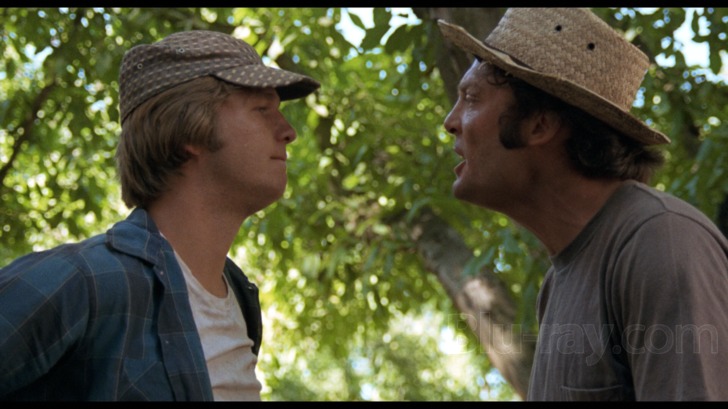
Fat City features a repurposed DTS-HD Master Audio 5.1 track, as well as a DTS-HD Master Audio 2.0 mono track recreating the film's theatrical exhibition. The surround track isn't overly showy, but it does open things up considerably in the fight sequences, offering spills of crowd sounds throughout the surround channels, while also placing discrete effects into various channels to offer good levels of immersion. Dialogue and score (which includes Kris Kristofferson's "Help Me Make It Through the Night" as well as a couple of other source cues) sound clean and clear. The 2.0 iteration offers clarity and precision as well, with a slightly less fulsome low end in some of the action sequences. Fidelity is excellent and dynamic range very wide.
Fat City Blu-ray Movie, Special Features and Extras 
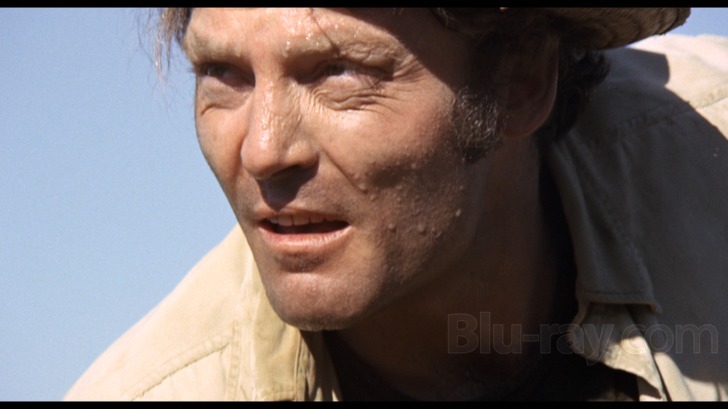
- Isolated Score Track is presented in DTS-HD Master Audio 5.1.
- Audio Commentary features Lem Dobbs hosted by Twilight Time's Nick Redman.
- Original Theatrical Trailer (1080p; 2:33)
Fat City Blu-ray Movie, Overall Score and Recommendation 
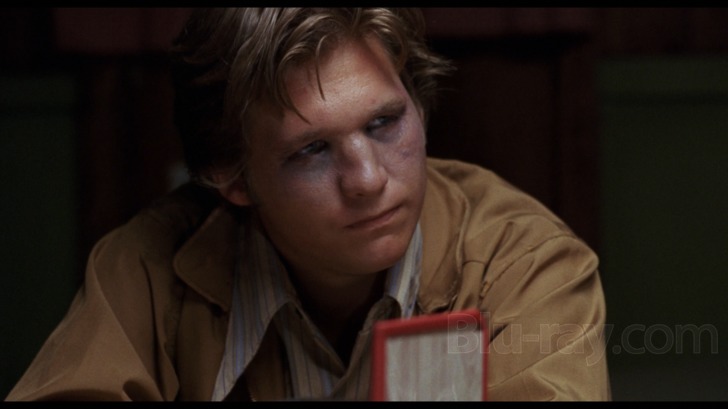
Huston has often done spectacular work looking at putative "losers" who are jonesin' for a Golden Ticket to the bigtime. He finds two near perfect examples of that type in Tully and Munger, and Keach and Bridges do exceptional work bringing the doleful and hopeful aspects of their characters fully to life. Tyrrell and Clark are also memorable in supporting roles, and the large secondary cast is very colorful and enjoyable. This is one of Huston's most interesting films, one which doesn't shy away from its inherent sadnesses, but one which remains strangely defiant and maybe even triumphant as it wends it way toward a bittersweet conclusion. Highly recommended.
Similar titles
Similar titles you might also like

Homeboy
1988

The Wrestler
2008

Blue Collar
1978

Million Dollar Baby
10th Anniversary Edition
2004

Raging Bull 4K
1980

Love Streams
1984

A Woman Under the Influence
1974

The Last Movie
1971

Blonde Venus
1932

The Last Detail 4K
Shout Select
1973

Faces
1968

Opening Night
1977

Medium Cool
1969

Shadows
1958

Two-Lane Blacktop
1971

Who's Afraid of Virginia Woolf?
Warner Archive Collection
1966

Black Narcissus
1947

Phantom Punch
2009

Breaking the Waves
1996

Hardcore
Special Edition
1979